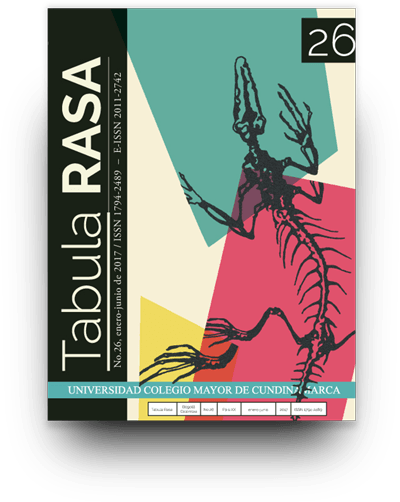Conceptual tools for an transforming critical anti-racism.
Herramientas conceptuales para un antirracismo crítico-transformador.
Show authors biography
In the face of the novel and renewed forms of racism, anti-racism at large and anti-racist social action in particular are enduring a crisis. The lack of impact and efficacy of actions is due both to methodological and conceptual reasons, which can be understood and explained by the implicit pattern underlying/at its bottom. Anti-racism needs to renew its theoretical and conceptual scaffolding so that it is able to overcome the crisis in which it is immersed. This paper presents several novel conceptual tools that can serveto this purpose, both to understand contemporary racism, face to which the classical anti-racist action happens to be ineffective, and to analyse critically the implicit pattern underlying most of these forms of action. Several coordinates are offered to help develop a critical-transforming anti-racist action.
Article visits 502 | PDF visits 164
Downloads
- Aguilar Idáñez, Mª J. (2011). El racismo institucional en las políticas e intervenciones sociales dirigidas a inmigrantes y algunas propuestas prácticas para evitarlo. Documentación Social, 162, 139-166.
- Aguilar Idáñez, Mª J. y Buraschi, D. (2012). El desafío de la convivencia intercultural. Revista Interdisciplinar da Mobilidade Humana REMHU, 38, 27-43. Disponible en: http://www.csem.org.br/remhu/index.php/remhu/article/view/298
- Aguilar-Idáñez, Mª J. y Buraschi, D. (2014). Formación en Trabajo Social con conciencia global y compromiso local: un caso de buena práctica educativa. Cuadernos de Trabajo Social, 27(2), 277-289. DOI: http://dx.doi.org/10.5209/rev_CUTS.2014.v27.n2.44557
- Aguilar-Idáñez, Mª J. y Buraschi, D. (2016). Del racismo y la construcción de fronteras morales a la resistencia y el cambio social: la sociedad civil frente a las migraciones forzosas. Servicios Sociales y Política Social, XXXIII (111), 29-44.
- Aguilar-Idáñez, Mª J. y Buraschi, D. (2017). Migrantes y refugiados: Apuntes clave para un nuevo relato. Revista Lusófona de Educação, 34 (en prensa).
- Austin, J. L. (1971). Cómo hacer cosas con palabras. Buenos Aires: Paidós.
- Balibar, E. y Wallerstein, I. (1991). Raza, nación y clase. Madrid: Iepala.
- Bello G. (2006). El valor de los otros. Más allá de la violencia intercultural. Biblioteca Nueva.
- Bourdieu, P. y Wacquant, L. (2005). Una invitación a la sociología reflexiva. Madrid: Siglo XXI.
- Brown, R. (1998). Prejuicio. Su psicología social. Madrid: Alianza Editorial.
- Buraschi, D. y Aguilar-Idáñez, Mª J. (2016). Indiferencia, fronteras morales y estrategias de resistencia. Documentación Social, 180, 127-147.
- Collins, P.H. (2000). Gender, Black Feminism, and Black Political Economy. Annals of the American Academy of Political and Social Science, 568, 41-53.
- Crenshaw, K. W. (1991). Mapping the Margins: Intersectionality, Identity Politics, and Violence against Women of Color, Stanford Law Review, 43(6), 1241–1299.
- Crocker, J., Major, B. y Steele, C. (1998). Social stigma. En S. Fiske, D. Gilbert, G. Lindzey (Eds.), Handbook of Social Psychology 2 (pp. 504–553). Boston, MA: McGraw-Hill.
- Dal Lago, A. (1999). Non persone. L’esclusione dei migranti in una società globale. Milano: Feltrinelli.
- De Sousa Santos, B. (2010). Epistemologías del sur. México: Siglo XXI.
- Essed, P. (1991). Understanding Everyday Racism. An interdisciplinary Theory. London: Sage.
- Esses, V.M., Jackson, L.M., Dovidio, J.F., & Hodson, G. (2005). Instrumental relations among groups: Group competition, conflict, and prejudice. En J.F. Dovidio, P. Glick, & L. Rudman (Eds.), Reflecting on the Nature of Prejudice (pp. 227-243). Oxford, UK: Blackwell.
- Estrada C. (2003). L’impact de l’essentialisme psychologique sur les processus intra et intergroupes. Tesis de doctorado. Université Catholique de Louvain, Bélgica.
- Fanon, F. (2001). Los condenados de la Tierra. México: Fondo de Cultura Económica.
- Fanon, F. (2010). Piel negra, máscaras blancas. Madrid: Akal.
- Gallissot, R. (1991). Razzismo e antirazzismo. La sfida dell’immigrazione. Bari: Dedalo.
- Grosfoguel, R. (2012). El concepto de «racismo» en Michel Foucault y Frantz Fanon: ¿teorizar desde la zona del ser o desde la zona del no-ser? Tabula Rasa, 16, 79-102.
- Hooks b. (1989). Talking Back: Thinking Feminist, Thinking Black. Boston: South End.
- Jabardo M.(ed.) (2012). Feminismos negros. Una antología. Madrid: Traficantes de sueños.
- Mate, R. (2003). Memoria de Auschwitz. Madrid: Trotta.
- Memmi, A. (2000). Racism. Minneapolis, Min., University of Minnesota Press.
- Navas, M. y Cuadrado, I. (2013). El estudio del Prejuicio en Psicología Social. Madrid: Sanz y Torres.
- Paluck, E.L. y Green, D.P. (2009). Prejudice reduction: What works? A critical look at evidence from the field and the laboratory. Annual Review of Psychology, 60, 339–367.
- Quijano, A. (1991). Colonialidad y Modernidad/Racionalidad. Perú Indígena, 2, 11-21.
- Rivera, A. (2010). La Bella, la Bestia e l'Umano. Sessismo e razzismo senza escludere lo specismo. Roma: Ediesse.
- San Román, T. (1996). Los muros de la separación. Ensayo sobre alterofobia y filantropía. Barcelona: Tecnos.
- Stephan, W. G., & Stephan, C. W. (2000). An integrated threat theory of prejudice. En S. Oskamp (Ed.), Reducing Prejudice and Discrimination (pp. 23-45). Mahwah, NJ: Lawrence Erlbaum Associated.
- Taguieff, P.A. (1988). La Force du préjugé. Essai sur le racisme et ses doubles. Paris: La Decouverte.
- Tajfel, H. y Turner, J. C. (1979). An Integrative Theory of Intergroup Conflict. En W. G. Austin & S. Worchel (eds.), The Social Psychology of Intergroup Relations (pp. 33-47). Monterrey, CA: Brooks-Cole.
- Tavanian P. (2008). La Mécanique raciste. París: Dilecta.
- Tubino, F. (2005). La interculturalidad crítica como proyecto ético-político. Encuentro continental de Eduvcadores Agustinos, Lima, enero 24-28. Disponible en: http://oala.villanova.edu/congresos/educacio%CC%81n/lima-ponen-02.html
- Van Dijk, T. (2003). Racismo y discurso de las élites. Barcelona: Gedisa.
- Walsh, C. (2008). Interculturalidad crítica y pedagogía de-colonial: Apuestas (Des)de el in-surgir, re-existir y re-vivir. Disponible en: http://studylib.es/doc/4694776/interculturalidad-cr%C3%ADtica-y-pedagog%C3%ADa-de-colonial








